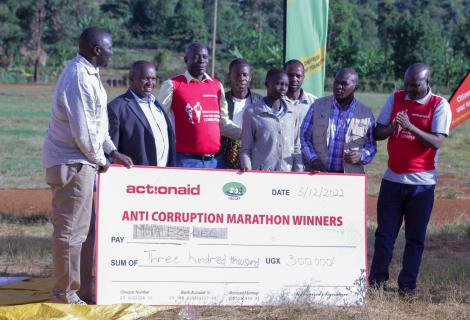Citizens Should Own the Fight Against Corruption

At the close of last year 2022, the community in the Sebei region gathered under the sweltering heat to participate in an activity that epitomizes their sweet spot: long-distance running. It was no ordinary race, but an anti-corruption marathon organized by the civil society in partnership with Joshua Cheptegei Foundation, a brainchild of Ugandan Commonwealth, Olympic and World Champion; Joshua Cheptegei.
Athletes of various age groups effortlessly finished the races of the day as residents cheered them on. When it appeared like the event was over, issues of national to regional importance took centre stage. First, ActionAid presented an issue paper on corruption and the state of service delivery in the Sebei Sub Region. Then the cream-de-la-cream led by Joshua Cheptegei used their influence to rally their community to stand up and fight against corruption.
Everything at the event was creatively organized to advance the fight against corruption, under the theme “Citizens Owning the War Against Corruption, it is the citizen’s war”. The skits and music from the locals did justice in driving the point home. After bouts of banter from the master of the ceremony, residents of various age groups were given a chance to raise questions to duty bearers (Local political and administrative leaders, representatives of Inspectorate of Government, Public Procurement and Disposal of Assets, etc) in the spirit of holding their leaders and duty bearers accountable. It was one of the most engaging sessions as residents boldly asked local council leaders, MPs, and various government officials tough questions about service delivery and unfulfilled promises amidst applause from the residents.
This initiative is a classic example of how to creatively rallying citizens to own the war against corruption, that is waning due to increasing impunity, as well as complacency. Conventional means of fighting corruption through boardroom engagements and legalistic responses may not appeal to many at the grassroots. What works in the Public Accounts Committee of Parliament may not be understood and owned the same way by residents in a remote village in Bukwo. Besides, due to increasing incidences of corruption and impunity by some public officials, the citizens have become apathetic about the idea that things can change and that the corrupt can be held accountable.
To awaken the citizens from their resignation to take a central place in the fight against corruption, anti-corruption crusaders need to be more innovative and use unconventional means to sustain the fight against corruption. It does not have to be athletics for all regions. It needs to be something that appeals to them. Some communities may be moved by soccer while others may be moved by performing arts. The point is to identify community and regional sweet spots. Then opinion leaders can rally behind these causes with the aim to get the citizens to own the war on corruption.
Once those at the grassroots embrace the war against corruption, it will mark a significant milestone in fighting corruption in Uganda. If citizens believe that there is power in their voices and actions, they can hold their leaders accountable. We will not have to wait for the IGG, State House or the Public Accounts Committee of Parliament to take action. Of course, these entities rightly have a legal mandate in the fight against corruption. But with a vibrant citizenry, the work of the anti-corruption bodies will be reduced because the culprits will be checked by the people who know them best.
It is important to give citizens an avenue to take active participation in holding their leaders accountable. This is because corruption affects them the most. When money for schools, roads, health centres, electricity, sports, and water projects is stolen, citizens at the grassroots suffer the most. The innovation of appealing approaches to citizen ownership and participation in the war on corruption is paramount. Otherwise, we risk leaving out those who have the power and are most affected by corruption.
Together we can awaken a country that knows its power and is actively involved in social accountability in its communities.
Andrew Onapito
Communications Officer
ActionAid International, Uganda